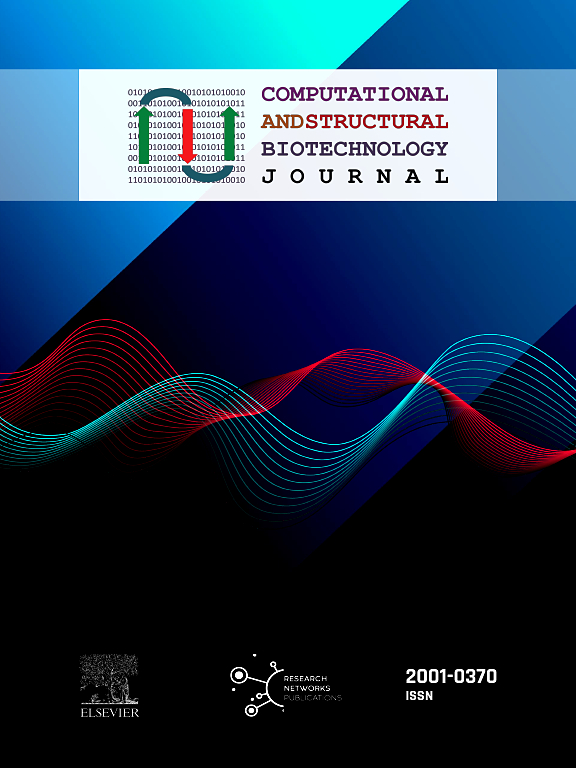Knowledge-based in silico fragmentation and annotation of mass spectra for natural products with MassKG
IF 4.4
2区 生物学
Q2 BIOCHEMISTRY & MOLECULAR BIOLOGY
Computational and structural biotechnology journal
Pub Date : 2024-09-07
DOI:10.1016/j.csbj.2024.09.001
引用次数: 0
Abstract
Liquid chromatography coupled with tandem mass spectrometry (LC-MS/MS) is a potent analytical technique utilized for identifying natural products from complex sources. However, due to the structural diversity, annotating LC-MS/MS data of natural products efficiently remains challenging, hindering the discovery process of novel active structures. Here, we introduce MassKG, an algorithm that combines a knowledge-based fragmentation strategy and a deep learning-based molecule generation model to aid in rapid dereplication and the discovery of novel NP structures. Specifically, MassKG has compiled 407,720 known NP structures and, based on this, generated 266,353 new structures using chemical language models for the discovery of potential novel compounds. Furthermore, MassKG demonstrates exceptional performance in spectra annotation compared to state-of-the-art algorithms. To enhance usability, MassKG has been implemented as a web server for annotating tandem mass spectral data (MS/MS, MS2) with a user-friendly interface, automatic reporting, and fragment tree visualization. Lastly, the interpretive capability of MassKG is comprehensively validated through composition analysis and MS annotation of , , and . MassKG is now accessible at .利用 MassKG 对天然产品的质谱进行基于知识的硅学片段分析和注释
液相色谱-串联质谱(LC-MS/MS)是一种有效的分析技术,可用于鉴定来源复杂的天然产物。然而,由于结构的多样性,对天然产物的 LC-MS/MS 数据进行有效注释仍然具有挑战性,阻碍了新型活性结构的发现过程。在此,我们介绍一种将基于知识的片段分析策略和基于深度学习的分子生成模型相结合的算法 MassKG,以帮助快速去复制和发现新型 NP 结构。具体来说,MassKG 已编译了 407,720 个已知 NP 结构,并在此基础上利用化学语言模型生成了 266,353 个新结构,用于发现潜在的新型化合物。此外,与最先进的算法相比,MassKG 在光谱注释方面表现出卓越的性能。为了提高可用性,MassKG 已被用作网络服务器,用于注释串联质谱数据(MS/MS、MS2),具有用户友好界面、自动报告和片段树可视化功能。最后,通过对 、 、 和 的成分分析和质谱注释,MassKG 的解释能力得到了全面验证。MassKG现在可以在.NET上访问。
本文章由计算机程序翻译,如有差异,请以英文原文为准。
求助全文
约1分钟内获得全文
求助全文
来源期刊

Computational and structural biotechnology journal
Biochemistry, Genetics and Molecular Biology-Biophysics
CiteScore
9.30
自引率
3.30%
发文量
540
审稿时长
6 weeks
期刊介绍:
Computational and Structural Biotechnology Journal (CSBJ) is an online gold open access journal publishing research articles and reviews after full peer review. All articles are published, without barriers to access, immediately upon acceptance. The journal places a strong emphasis on functional and mechanistic understanding of how molecular components in a biological process work together through the application of computational methods. Structural data may provide such insights, but they are not a pre-requisite for publication in the journal. Specific areas of interest include, but are not limited to:
Structure and function of proteins, nucleic acids and other macromolecules
Structure and function of multi-component complexes
Protein folding, processing and degradation
Enzymology
Computational and structural studies of plant systems
Microbial Informatics
Genomics
Proteomics
Metabolomics
Algorithms and Hypothesis in Bioinformatics
Mathematical and Theoretical Biology
Computational Chemistry and Drug Discovery
Microscopy and Molecular Imaging
Nanotechnology
Systems and Synthetic Biology
 求助内容:
求助内容: 应助结果提醒方式:
应助结果提醒方式:


